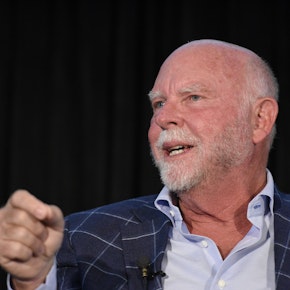Explore
Search results


Technology is redefining who we trust, and this shift in trust has fundamental consequences.

Once associated mostly with IV poles and standard-issue hospital gowns, health-related design has entered a new era with creative and functional products that observe, inform, soothe, and connect. A stuffed animal named Chemo Duck helps children with cancer express their emotions; new digital health records give nurses in Rwanda the tools to provide quality care and improv...


China was the first country in the world to experience effects from COVID-19. How did the country make it through?

Gun violence in the US is a public health epidemic. With partisan battles currently making state and federal legislative solutions elusive, private sector trendsetters are quietly exploring other avenues of opportunity. The Smart Tech Challenges Foundation funds research to advance biometric identification and other security technologies that allow only authorized users to...

Nanobiophysics draws together the mainstays of physics, such as mechanical forces and electromagnetic fields, with the biochemical and cellular processes at the foundation of medicine. Anita Goel, a pioneer in this emerging platform, helped rocket MRSA, the antibiotic-resistant superbug, to the International Space Station so that scientists can study the influence of micro...

The notoriously opaque healthcare landscape has been difficult for anyone to navigate. Patients need ways to find culturally sensitive providers, make wise medical decisions, understand their bills, and find communities of consumers facing similar health challenges. Health systems, employers, and insurers are looking for opportunities to personalize quality services, inclu...

Scientists at the cutting-edge of neurobiology are studying the rhythms of electrical activity within the brain and learning more about how malfunctioning neural circuitry links to mental illness. Kafui Dzirasa, one of the pioneers in the field, is trying to build a “pacemaker for the brain,” drawing on new technologies to stimulate neurons, alter electrical patterns, and...


Technology is transforming how we provide medical care, improve diagnostics, share information, and extend the reach of public health. From disposable syringes that deliver a calibrated dose of medicine before self-destructing to 3-D printers that recreate the facial structures of combat-injured veterans, seemingly intractable problems are being met with cutting-edge solut...

Whether we are using apps to count steps or talking to our doctors via video, most of us are already familiar with digital health in some form. But innovation at the intersection of health and technology—with its promise of improving health outcomes, enhancing patient satisfaction, and strengthening the healthcare system—is just getting started. Not only is technology bett...

Meet Lucy He, a 2022 Aspen Ideas: Health Fellow who's using technology and policy change to address critical delays in patient care caused by the "prior authorization" process.

From revolutionary advancements aiding paralysis patients to the therapeutic treatment of PTSD, brain-computer interfaces (BCIs) possess boundless potential for merging human biology with cutting-edge technology in unprecedented ways. Three visionaries in this field demonstrate what’s possible now and offer insights into the future trajectory of this technology.

The belief that the paralyzed will walk and the deaf will hear is a staple of religion, literature, and myth. Now, technology is actually making that happen. Zeen has designed a battery-free mobility device to combine the best functions of a walker and wheelchair. Wristbands created by Neosensory feed sound vibrations directly from the skin to the brain, improving the abil...

Research that can generate transformative, high-impact biomedical and health breakthroughs, from the molecular to the societal, is gaining traction as the Advanced Research Projects Agency for Health (ARPA-H) gets off the ground. Launched by federal legislation in March 2022, ARPA-H will make pivotal investments to stimulate dynamic health solutions that can reshape millio...

With advances in testing and technology, the world of professional sports is beginning to use data to evaluate athlete health and to predict — and ideally, prevent — injury. Experts equipped with 3D motion capture technology are now essential members of team training staffs. Are these new technologies and recovery interventions increasing player longevity? Will cost-effect...

The recent leaps of science—sequencing the human genome, advancing the world-changing technology of CRISPR, deepening knowledge of the brain—owe much to Francis Collins’s brilliant mind and steady hand. Who better, then, to talk about what transformative discoveries come next? Genomics, immunotherapy, precision medicine, new uses for mRNA technology, and other interdiscipl...


Tim O’Reilly says we should be harnessing technology, rather than fearing it.

The United States is experiencing a critical shortage of healthcare workers—with labor market data showing a 3.2 million worker deficit by 2026. The growing crisis is causing disruptions across the healthcare landscape, but novel care models and new technology show promise in revolutionizing care delivery. How are hospitals leveraging existing technology and teams to reima...

Dr. J. Craig Venter, one of the pioneers in human genome sequencing, talks about coming opportunities to use genomics, advanced technology and machine learning to custom-tailor individual care and fundamentally alter the practice of medicine.


David Agus, author of "The Lucky Years," says we’re living in a golden age when the latest science and technology can customize care.







